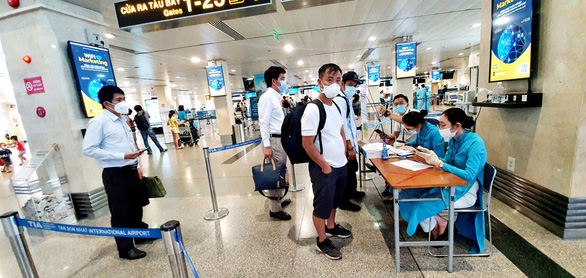Ho Chi Minh City has announced a five-step medical process for air passengers from abroad for early detection of the Omicron variant of the coronavirus after five recent cases of entry that were initially found positive for the strain but retested negative shortly after.
The municipal administration issued the process on Saturday as the city had become the third location to record such Omicron cases, after Hanoi and central Quang Nam Province with 15 confirmed cases in total.
According to the protocol, people entering Vietnam from abroad through Tan Son Nhat International Airport must first register their personal QR code by installing the PC-COVID app on their smartphone and using it for registration.
Otherwise, they are required to make such registration at https://antoan-covid.tphcm.gov.vn.
The airport authority should arrange a separate area with full equipment for passengers to create their personal QR code upon arrival.
In order to save time, passengers are encouraged to the code in advance of departure for Vietnam, local authorities said.
In the second step, passengers will undergo a rapid COVID-19 test upon their arrival, and those found negative will continue other procedures to leave the airport while those with positive results will have their samples taken for real-time RT-PCR testing.
These cases must be immediately reported to the local Center for Disease Control, which will coordinate with 115 Emergency Center to take the patients to Field Hospital No. 12 in the city’s Thu Duc City.
In the next step, nobody is allowed to accompany arrivals from abroad in the same vehicles that bring them from the airport to their accommodations, except for their drivers and interpreters, if any.
All epidemic prevention measures must be complied with during the transport, with the vehicles discouraged from stopping along the way.
The fourth step will see local authorities confirm the presence of arrivals from overseas by scanning their QR code as soon as they reach their residence, and they are required to self-monitor their health and make health declarations using the PC-COVID app.
Pursuant to current rules, international arrivals who are fully vaccinated or those having recovered from COVID-19 for no more than six months are put in home quarantine for three days upon entering Vietnam.
If they have received no vaccination or been partially inoculated, a seven-day isolation period is applied.
If the quarantined are minors or aged 65 and over, pregnant women, or people with underlying health conditions, they may be accompanied by a caretaker who has been fully vaccinated or have recovered from COVID-19 for no longer than six months.
In the final step, quarantined people will have their samples taken for real-time RT-PCR tests, and district health centers will manage them through the website of the city’s COVID-19 Safety Information Portal by using login accounts granted by district administrations.
Those with negative results will be monitored until the end of the 14th day after their entry dates, while those found positive will be taken to a designated field hospital and their samples will be sent to the Ho Chi Minh City Pasteur Institute for genome sequencing to detect the Omicron variant.
This medical protocol was released after the said five Omicron cases were detected among the passengers entering Vietnam through the southern city’s Tan Son Nhat International Airport from overseas between December 21 and 25.
They were a 29-year-old Turkish woman, who is a flight attendant, and four Vietnamese, including two men and two women aged 22 to 49, according to the Department of Health.
The five had their nasal swabs collected for testing on December 26 before the results came back positive for the Omicron variant on December 31, as their genome sequencing had been conducted by the Ho Chi Minh City Pasteur Institute, the department said.
They retested negative for the mutant on Saturday, the department said, adding that their health conditions were stable.
The first Omicron infection in the Southeast Asian country was confirmed on December 21 in a Vietnamese man who returned to Hanoi from the UK two days earlier.
The central province of Quang Nam on Thursday became the second locality affected by the new variant with 14 infections logged on November 30. All these cases are Vietnamese who returned from the U.S. and South Korea.
The Omicron mutant, a.k.a. the B.1.1.529 variant, was designated by the World Health Organization (WHO) as a variant of concern on November 26, two days after it was first reported to WHO by South Africa.
Omicron has now been found in over 110 countries and territories, with health experts stating it appears to be more contagious but less virulent than previous strains.
As of Saturday, Vietnam had documented 1,746,092 COVID-19 cases, with 1,358,276 recoveries and 32,610 fatalities, the health ministry reported.
Health workers have administered more than 152.2 million vaccine doses since vaccination was rolled out nationwide on March 8.
By the last day of 2021, 90 percent of Vietnam’s adult population, or around 75 million people, had received two doses of COVID-19 vaccine, while 100 percent had been given at least one shot, according to the Vietnam Government Portal.
The health ministry has called on all localities to make more efforts to complete the coverage of second-vaccine doses for children aged 12 to 17 in January.
Like us on Facebook or follow us on Twitter to get the latest news about Vietnam!



















































